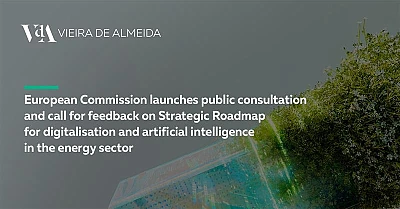On 5 August, the European Commission launched a call for evidence and a public consultation to gather input for the preparation of its Strategic Roadmap for digitalisation and artificial intelligence (AI) in the energy sector. Based on the EU Action Plan for the Digitalisation of the Energy System adopted in 2022, the Energy Roadmap aims to accelerate the transition to a more efficient, sustainable and competitive energy system. In addition, it also explores the opportunities and challenges related to the large-scale deployment of AI solutions in the energy sector.
This initiative, scheduled for the first quarter of 2026, is in line with the European Union's policy guidelines for 2024-2029, which highlight the need to reduce energy prices, move away from fossil fuels and ensure a fair green and digital transition for consumers and businesses. The initiative will also complement the Commission's ongoing work in the field of AI, including the AI Regulation and the AI Continent Action Plan.
The Roadmap recognises that digitalisation and AI have the potential to transform the energy sector, but face challenges such as limited access to quality energy data, uneven adoption of digital technologies due to pre-existing infrastructure across Member States, increased energy consumption by digital technologies (specially data centres) and the risks inherent with integrating digital tools into critical infrastructure (e.g. cybersecurity).
The Commission proposes five main objectives in the initiative:
- Accelerate the deployment of digital and AI solutions by establishing an EU coordination framework to facilitate continuous access to energy data;
- Promote research and innovation with the introduction of digital and AI solutions for the energy sector, taking advantage of EU funding programmes;
- Integrate the energy needs of data centres into the energy system in a sustainable way, promoting dialogue and coordination between the players involved (producers, operators, Member States and regulators) and reducing pressure on electricity grids;
- Enhance transparency and risk oversight by developing guidelines for the use of AI systems and establishing incident reporting mechanisms; and
- Establish a robust framework for governance and coordination between governments, the private sector, civil society and research institutions.
The expected impacts include optimising the planning and operation of electricity grids, greater integration of renewable energies, empowering consumers through smart energy management, promoting new business models, accelerating research into clean energies and better integration of data centres into the electricity grid.
The document stresses that coordinated EU action is essential to avoid regulatory fragmentation, ensure European competitiveness and to ensure that the benefits of digitalisation and AI are widely distributed, while keeping the associated risks under control.
All individuals and businesses are invited to participate in the public consultation and contribute to the call for evidence, especially if they are part of the digital and energy value chain.
Comments may be submitted until 5 November 2025.
